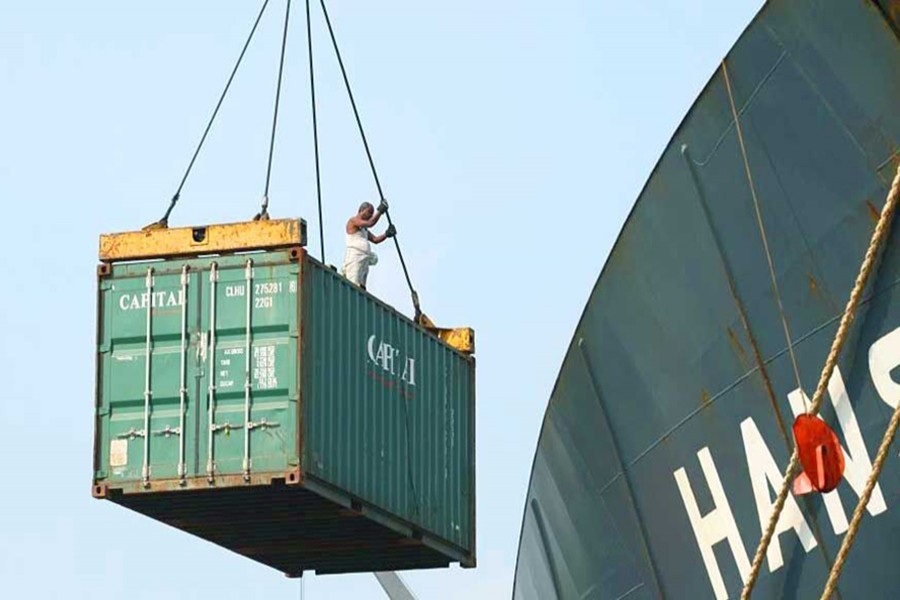The government has backtracked from a plan to propose the United States for signing a free trade area (FTA) deal considering its lack of preparedness, an official says.
Failing to get the generalised system of preferences (GSP) facility restored in the US market, the government had planned to ease the duty burden by signing the FTA accord with Bangladesh's single largest export destination.
The Bangladesh Trade and Tariff Commission studied the feasibility of signing a free trade pact with the US, which found that the country could reap financial benefits only if the deal is signed on trade issues.
However, it found various barriers including shortcomings on labour and human rights issues, differences on intellectual property rights, public procurement system, service sector, and investment issues may not favour inking a deal with the US.
A senior commerce ministry official told the FE the ministry high-ups had earlier discussed on proposing the US in the next meeting of the Trade and Investment Cooperation Forum Agreement (TICFA) for the agreement that will see tariff eliminate on both sides.
But now the ministry officials think that such a proposal would not draw any positive signal from the US side. Even if the US agrees, Bangladesh would not be able to meet the rigorous conditions to be imposed by the world's biggest economy, he added.
Bangladesh lost the GSP facility in the US market after the Rana Plaza collapse back in 2013, and since then it has implemented various labour rights conditions set by the US and the European Union.
However, the US did not restore the GSP facility and is still putting pressure to further improve workplace safety and labour rights.
The government functionaries believed revoking the GSP facility is a "politically motivated" decision of the US.
Due to the GSP facility cancellation, apparels, Bangladesh's main exportable item, enter the US market by paying as much as 15 per cent duty, making exporters less-competitive.
Bangladesh Trade and Tariff Commission member Mostafa Abid Khan told the FE on Friday the US usually strikes comprehensive FTA deals, covering trade in goods, trade in services, and trade in investments.
"Firstly, the matter is whether the US will agree or not. Secondly, are we able to address many pressing issues?" he asked.
Mr Khan said the Bangladesh market is tiny in terms of the size of US's overall external trade. "The trade in goods is not the main issue, many other issues are there. Considering all other things, US's interest is very minimal."
He suggested that Bangladesh should slash duty burden through product diversification and exporting goods other than apparels. "The duty on apparel is very high while for other products, it is not high."
Research director of the Centre for Policy Dialogue (CPD) Dr Khondaker Golam Moazzem told the FE on Friday the US suspended GSP facility mainly on labour standard issue, which will remain a sticking point in case of any future deal.
"Since the US is not restoring the GSP on labour rights concern, it also would not sign the FTA with Bangladesh, leaving the issue unaddressed," he said.
After Rana Plaza collapse, Mr Moazzem said, conditions on labour rights came only in case of the apparel and shrimp sectors. "Even if the US agrees to sign the FTA deal, now the labour standard issues will be applicable to all sectors."
"Considering these, we are not prepared at all," he said.
When the US signs an FTA deal, it not only considers trade, it also assesses investment, public procurement, intellectual property rights, and governance among other standards.
"We will face big challenges in this case because the practices we follow is not compatible with such deals," Mr Moazzem added.
Bangladesh exported goods to the USA worth $6.7 billion in 2019, up by 9.5 per cent compared to 2018. On the other hand, the US exported goods worth $2.3 billion to Bangladesh in 2019, up by 12.4 from the previous year.
Bangladesh's major exportable items to the USA include apparels, footwear, pharmaceuticals, plastic, leather, ceramic, tobacco and textile fibre.
The US's top exports to Bangladesh in 2019 were aircraft, grain, seeds, fruit (soybeans), cotton, iron and steel, and machinery.
The USA is a major investor in Bangladesh, focused mainly on the energy and power sector. In 2018, the US companies invested some $2.1 billion, up by 43 per cent compared with the previous year.
syful-islam@outlook.com


